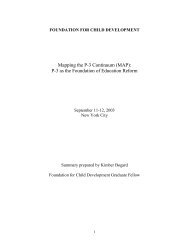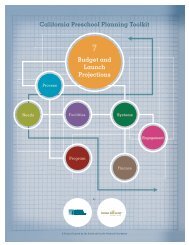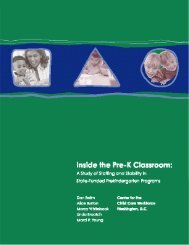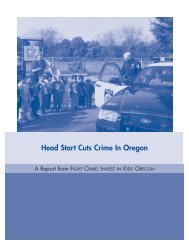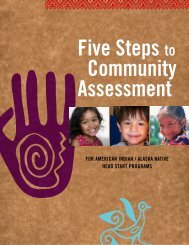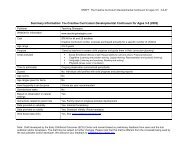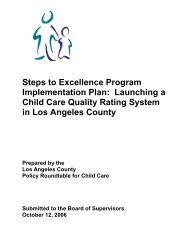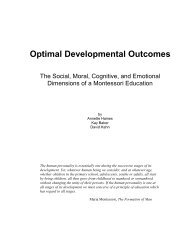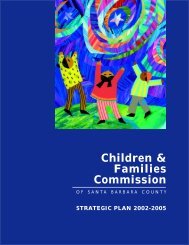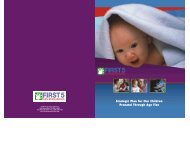Download this file - Plan4Preschool
Download this file - Plan4Preschool
Download this file - Plan4Preschool
You also want an ePaper? Increase the reach of your titles
YUMPU automatically turns print PDFs into web optimized ePapers that Google loves.
Immunization and Health Checkup <br />
California law requires each child to have up-to-date immunizations. Children are<br />
exempt from immunization requirements when (1) their parents sign a statement at the<br />
school indicating that such immunization is contrary to their beliefs; or (2) the parents<br />
submit a statement from a physician indicating that immunization is not considered safe<br />
for the child. An exemption may be temporary or permanent and may be for specific or<br />
all vaccines.<br />
The federal McKinney-Vento Homeless Assistance Act requires that schools enroll<br />
students who are homeless without requiring proof of immunization. California law<br />
requires that schools immediately enroll foster children even if a foster child is unable to<br />
produce immunization records normally required for school entry. Once a homeless<br />
student or a foster child is enrolled, schools should work with their local health<br />
department to ensure these students receive any vaccinations they may need.<br />
State law also requires each child’s family to provide, within 90 days of entrance into the<br />
first grade, a certificate documenting that the child has received a health checkup within<br />
the previous 18 months. Parents may waive the health checkup requirement because<br />
they do not want or are unable to obtain a health screening for their child. If the waiver<br />
indicates that the parents were unable to obtain such services, the reasons must be<br />
included in the waiver. Law requires school districts to exclude any first grader up to five<br />
days if the child has neither a health examination certificate nor a parental waiver 90<br />
days after entering the first grade.<br />
Some children may be eligible for a state-paid examination. Referrals to doctors and<br />
clinics are provided on request by the Child Health and Disability Prevention (CHDP)<br />
Program coordinator of the local health department. Children through age 18 may<br />
receive a free checkup funded by CHDP if their families meet specific income<br />
guidelines. Most county health departments have a CHDP coordinator who can advise<br />
parents regarding eligibility.<br />
All children under eighteen years of age entering a California public or private<br />
elementary or secondary school for the first time, or transferring between schools, must<br />
present a written immunization record, including at least the month and year of receipt<br />
of each dose of required vaccines (or an exemption to the immunization requirements).<br />
Otherwise, the child will not be allowed to attend school.<br />
To meet California’s school entry requirements, children entering kindergarten will need<br />
a total of five DTP (diphtheria, tetanus, and pertussis) immunizations; four polio<br />
immunizations; two MMR (measles, mumps, and rubella) immunizations; three hepatitis<br />
B immunizations; and one varicella (chicken pox) immunization. Students entering<br />
seventh grade must show proof of three hepatitis B shots and a second measles (or<br />
MMR) shot. Students can be admitted if they have had at least the first in the three-shot<br />
hepatitis B series on condition that the remaining shots are completed when due. All<br />
27



